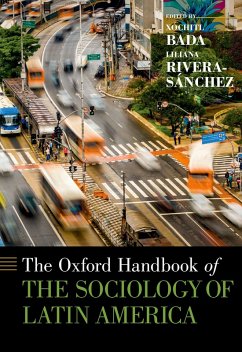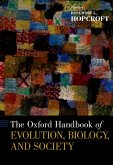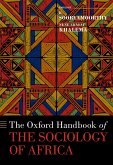The Oxford Handbook of the Sociology of Latin America (eBook, PDF)
Redaktion: Bada, Xochitl; Rivera-Sánchez, Liliana


Alle Infos zum eBook verschenken

The Oxford Handbook of the Sociology of Latin America (eBook, PDF)
Redaktion: Bada, Xochitl; Rivera-Sánchez, Liliana
- Format: PDF
- Merkliste
- Auf die Merkliste
- Bewerten Bewerten
- Teilen
- Produkt teilen
- Produkterinnerung
- Produkterinnerung

Hier können Sie sich einloggen

Bitte loggen Sie sich zunächst in Ihr Kundenkonto ein oder registrieren Sie sich bei bücher.de, um das eBook-Abo tolino select nutzen zu können.
The sociology of Latin America, established in the region over the past eighty years, is a thriving field whose major contributions include dependence theory, world-systems theory, and historical debates on economic development, among others. The Oxford Handbook of the Sociology of Latin America provides research essays that introduce the readers to the discipline's key areas and current trends, specifically with regard to contemporary sociology in Latin America, as well as a collection of innovative empirical studies deploying a variety of qualitative and quantitative methodologies. The…mehr
- Geräte: PC
- mit Kopierschutz
- eBook Hilfe
- Größe: 5.33MB
![The Oxford Handbook of Energy and Society (eBook, PDF) The Oxford Handbook of Energy and Society (eBook, PDF)]() The Oxford Handbook of Energy and Society (eBook, PDF)67,95 €
The Oxford Handbook of Energy and Society (eBook, PDF)67,95 €![The Oxford Handbook of Evolution, Biology, and Society (eBook, PDF) The Oxford Handbook of Evolution, Biology, and Society (eBook, PDF)]() The Oxford Handbook of Evolution, Biology, and Society (eBook, PDF)73,95 €
The Oxford Handbook of Evolution, Biology, and Society (eBook, PDF)73,95 €![The Oxford Handbook of the Sociology of Africa (eBook, PDF) The Oxford Handbook of the Sociology of Africa (eBook, PDF)]() The Oxford Handbook of the Sociology of Africa (eBook, PDF)87,95 €
The Oxford Handbook of the Sociology of Africa (eBook, PDF)87,95 €![The Oxford Handbook of Crime Prevention (eBook, PDF) The Oxford Handbook of Crime Prevention (eBook, PDF)]() Brandon C. WelshThe Oxford Handbook of Crime Prevention (eBook, PDF)39,95 €
Brandon C. WelshThe Oxford Handbook of Crime Prevention (eBook, PDF)39,95 €![The Oxford Handbook of Police and Policing (eBook, PDF) The Oxford Handbook of Police and Policing (eBook, PDF)]() The Oxford Handbook of Police and Policing (eBook, PDF)29,95 €
The Oxford Handbook of Police and Policing (eBook, PDF)29,95 €![The Oxford Handbook of Pierre Bourdieu (eBook, PDF) The Oxford Handbook of Pierre Bourdieu (eBook, PDF)]() The Oxford Handbook of Pierre Bourdieu (eBook, PDF)98,95 €
The Oxford Handbook of Pierre Bourdieu (eBook, PDF)98,95 €![The Oxford Handbook of Cognitive Sociology (eBook, PDF) The Oxford Handbook of Cognitive Sociology (eBook, PDF)]() The Oxford Handbook of Cognitive Sociology (eBook, PDF)91,95 €
The Oxford Handbook of Cognitive Sociology (eBook, PDF)91,95 €-
-
-
Dieser Download kann aus rechtlichen Gründen nur mit Rechnungsadresse in A, B, BG, CY, CZ, D, DK, EW, E, FIN, F, GR, HR, H, IRL, I, LT, L, LR, M, NL, PL, P, R, S, SLO, SK ausgeliefert werden.
- Produktdetails
- Verlag: OUP eBook
- Seitenzahl: 896
- Erscheinungstermin: 9. April 2021
- Englisch
- ISBN-13: 9780190926571
- Artikelnr.: 61531018
- Verlag: OUP eBook
- Seitenzahl: 896
- Erscheinungstermin: 9. April 2021
- Englisch
- ISBN-13: 9780190926571
- Artikelnr.: 61531018
- Herstellerkennzeichnung Die Herstellerinformationen sind derzeit nicht verfügbar.
* A Detailed Panorama
* Javier Auyero
* Part 1: Introduction
* 1. On the Sociology of Latin America: Some Key Pieces of the Puzzle
* Liliana Rivera-Sánchez and Xóchitl Bada
* Part 2: Sociology of the State
* Coordinator: Viviane Brachet-Márquez
* 2. States in Latin America": Are They Still Worth Studying? An
Introduction
* Viviane Brachet-Márquez
* 3. Historical Construction of the State in Latin America: A Field in
Formation
* Viviane Brachet-Márquez
* 4. Revolution and Counterrevolution in Guatemala: The Contention over
Changing a Seigneurial Society
* Matilde González-Izás
* 5. Capitalism and the State in Latin America: Economic Power, Social
Inequality, and Environmental Depletion
* Esteban Torres and Carina Borrastero
* 6. From Social Insurance to Poverty Relief: Avatars of Social
Protection in Latin America
* Mónica Uribe Gómez
* Part 3: Social Inequalities
* Coordinator: Minor Mora-Salas
* 7. The Sociology of Social Inequality in Latin America
* Minor Mora-Salas
* 8. Differences, Inequalities, and Labor Markets in Latin America:
Some Hypotheses
* Juan Pablo Pérez Sáinz
* 9. Inequality, Social Mobility, and Racism in Bolivia
* Carmen Rosa Rea Campos
* 10. Patterns of Social Inclusion and Exclusion Among Youth Living in
Stigmatized Neighborhoods
* Fabiana Espíndola Ferrer
* 11. Social Violence and Privilege. Strategies of the Upper Middle
Class in San Salvador
* Irene Lungo Rodríguez
* 12. Inequality and Social Justice in Latin America: Youth's
Perception and Values
* Celi Scalon and Pedro Paulo de Oliveira
* 13. Ideological Inversion and the (De)legitimation of Neoliberalism
in Chile
* Ismael Puga
* 14. Privilege Accumulation Among Upper Middle-Class Youth in Mexico
* Minor Mora-Salas and Orlandina de Oliveira
* Part 4: Sociology of Religion
* Coordinator: Olga Odgers-Ortiz
* 15. From Sociology of Latin American Religions to a Latin American
Sociology of Religion
* Olga Odgers-Ortiz
* 16. The Sociology of Religion in Latin America: from Theoretical
Dependence to Its Specificity
* Roberto Blancarte
* 17. Religious Diversity, Popular Religions and Multiple Modernities
* Cristián Parker Gumucio
* 18. Four Keys to Understanding Religious Experience in Latin America
* Hugo José Suárez
* 19. Practices of Sacralization: A Theoretical Proposal for a
Sociology of (Popular) Religion from Latin America
* Eloísa Martín
* Part 5: Social Movements and Collective Action
* Coordinator: Nicolás M. Somma
* 20. Social Movements in Latin America: Mapping the Literature
* Nicolás M. Somma
* 21. Labor Movements in Latin America
* Federico M. Rossi
* 22. Latin American Women's Movements: A Historical Overview
* Cora Fernández Anderson
* 23. Student Movements in Latin America
* Germán Bidegain and Marisa von Bülow
* 24. Indigenous Movements in Latin America: Tensions, Contradictions,
Possibilities
* Roberta Rice
* 25. Economic Globalization and Social Movements in Latin America
* Paul Almeida and Amalia Pérez Martín
* Part 6: Sociology of Migration
* Coordinators: Liliana Rivera-Sánchez and Eduardo Domenech
* 26. Sociology of Migration in Latin America: Formation and
Development of a Field of Study
* Liliana Rivera-Sánchez and Eduardo Domenech
* 27. Migration and Development in Latin America
* Alejandro I. Canales
* 28. Migration, Borders, and Identity in the Latin American Context
* Laura Velasco Ortiz
* 29. Gender and Migration in Latin America
* Marina Ariza
* 30. Migration and Immigrant Organizational Forms in Latin America
* Luis Escala Rabadán and Xóchitl Bada
* Part 7: Sociology of Gender
* Coordinator: Gioconda Herrera
* 31. The Sociology of Gender in Latin America: from Social Mothers to
Sexual Rights
* Gioconda Herrera
* 32. Violence Against Women: Contributions from Latin America
* Montserrat Sagot
* 33. Contributions from the Sociology of Care in Latin America
* Karina Batthyány
* 34. Gender and Work in Contemporary Latin America
* Erynn Masi de Casanova
* Part 8: Medical Sociology
* Coordinator: Roberto Castro
* 35. Medical Sociology in Latin America
* Roberto Castro
* 36. The Trajectory and Identity of Sociology of Health in Brazil
* Everardo Duarte Nunes and Maria Cecília de Souza Minayo
* 37. A Sociological Approach to the Study of Alternative and
Complementary Medicine in Argentina
* Betina Freidin and Matías Ballesteros
* 38. Sexual Stratification and Sexual Agency Among Low-Income Girls in
an Andean City
* Carmen Yon Leau
* 39. Mexican Women and Decision Making in Health: The Practical Sense
* María del Carmen Castro Vásquez and Patricia Aranda Gallegos
* Part 9. Sociology of Violence and Insecurity
* Coordinator: Arturo Alvarado
* 40. The Sociology of Crime and Violence in Latin America
* Arturo Alvarado
* 41. Sociology of Fear of Crime in Latin America
* Gabriel Kessler and Alejandra Otamendi
* 42. Homicides in Latin America and the Caribbean
* Alberto Concha-Eastman, Edgar Muñoz and Mateus Rennó-Santos
* 43. Arming the Americas
* Katherine Aguirre and Robert Muggah
* 44. Urban Violence and the Spatial Question: The Built Environmental
Correlates of (In)Security in Latin American Cities
* Diane E. Davis
* 45. Border Violence in Latin America: An Expression of Complementary
Asymmetries
* Fernando Carrión-Mena and Markus Gottsbacher
* 46. Illicit Drugs and Organized Crime in Latin America: New
Scholarship and the Future of Alternative Policies
* Angélica Durán-Martínez
* 47. Forced Displacement and Globalization in Latin America: Causal
Factors, Policies, and Perspectives
* Pablo Emilio Angarita-Cañas
* 48. Violent Victimization in Poor Neighborhoods of Bogotá, Lima, and
Santiago: Empirical Test of the Social Disorganization and the
Collective Efficacy Theories
* Liliana Manzano, Alejandra Mohor, and Williams Jiménez
* A Detailed Panorama
* Javier Auyero
* Part 1: Introduction
* 1. On the Sociology of Latin America: Some Key Pieces of the Puzzle
* Liliana Rivera-Sánchez and Xóchitl Bada
* Part 2: Sociology of the State
* Coordinator: Viviane Brachet-Márquez
* 2. States in Latin America": Are They Still Worth Studying? An
Introduction
* Viviane Brachet-Márquez
* 3. Historical Construction of the State in Latin America: A Field in
Formation
* Viviane Brachet-Márquez
* 4. Revolution and Counterrevolution in Guatemala: The Contention over
Changing a Seigneurial Society
* Matilde González-Izás
* 5. Capitalism and the State in Latin America: Economic Power, Social
Inequality, and Environmental Depletion
* Esteban Torres and Carina Borrastero
* 6. From Social Insurance to Poverty Relief: Avatars of Social
Protection in Latin America
* Mónica Uribe Gómez
* Part 3: Social Inequalities
* Coordinator: Minor Mora-Salas
* 7. The Sociology of Social Inequality in Latin America
* Minor Mora-Salas
* 8. Differences, Inequalities, and Labor Markets in Latin America:
Some Hypotheses
* Juan Pablo Pérez Sáinz
* 9. Inequality, Social Mobility, and Racism in Bolivia
* Carmen Rosa Rea Campos
* 10. Patterns of Social Inclusion and Exclusion Among Youth Living in
Stigmatized Neighborhoods
* Fabiana Espíndola Ferrer
* 11. Social Violence and Privilege. Strategies of the Upper Middle
Class in San Salvador
* Irene Lungo Rodríguez
* 12. Inequality and Social Justice in Latin America: Youth's
Perception and Values
* Celi Scalon and Pedro Paulo de Oliveira
* 13. Ideological Inversion and the (De)legitimation of Neoliberalism
in Chile
* Ismael Puga
* 14. Privilege Accumulation Among Upper Middle-Class Youth in Mexico
* Minor Mora-Salas and Orlandina de Oliveira
* Part 4: Sociology of Religion
* Coordinator: Olga Odgers-Ortiz
* 15. From Sociology of Latin American Religions to a Latin American
Sociology of Religion
* Olga Odgers-Ortiz
* 16. The Sociology of Religion in Latin America: from Theoretical
Dependence to Its Specificity
* Roberto Blancarte
* 17. Religious Diversity, Popular Religions and Multiple Modernities
* Cristián Parker Gumucio
* 18. Four Keys to Understanding Religious Experience in Latin America
* Hugo José Suárez
* 19. Practices of Sacralization: A Theoretical Proposal for a
Sociology of (Popular) Religion from Latin America
* Eloísa Martín
* Part 5: Social Movements and Collective Action
* Coordinator: Nicolás M. Somma
* 20. Social Movements in Latin America: Mapping the Literature
* Nicolás M. Somma
* 21. Labor Movements in Latin America
* Federico M. Rossi
* 22. Latin American Women's Movements: A Historical Overview
* Cora Fernández Anderson
* 23. Student Movements in Latin America
* Germán Bidegain and Marisa von Bülow
* 24. Indigenous Movements in Latin America: Tensions, Contradictions,
Possibilities
* Roberta Rice
* 25. Economic Globalization and Social Movements in Latin America
* Paul Almeida and Amalia Pérez Martín
* Part 6: Sociology of Migration
* Coordinators: Liliana Rivera-Sánchez and Eduardo Domenech
* 26. Sociology of Migration in Latin America: Formation and
Development of a Field of Study
* Liliana Rivera-Sánchez and Eduardo Domenech
* 27. Migration and Development in Latin America
* Alejandro I. Canales
* 28. Migration, Borders, and Identity in the Latin American Context
* Laura Velasco Ortiz
* 29. Gender and Migration in Latin America
* Marina Ariza
* 30. Migration and Immigrant Organizational Forms in Latin America
* Luis Escala Rabadán and Xóchitl Bada
* Part 7: Sociology of Gender
* Coordinator: Gioconda Herrera
* 31. The Sociology of Gender in Latin America: from Social Mothers to
Sexual Rights
* Gioconda Herrera
* 32. Violence Against Women: Contributions from Latin America
* Montserrat Sagot
* 33. Contributions from the Sociology of Care in Latin America
* Karina Batthyány
* 34. Gender and Work in Contemporary Latin America
* Erynn Masi de Casanova
* Part 8: Medical Sociology
* Coordinator: Roberto Castro
* 35. Medical Sociology in Latin America
* Roberto Castro
* 36. The Trajectory and Identity of Sociology of Health in Brazil
* Everardo Duarte Nunes and Maria Cecília de Souza Minayo
* 37. A Sociological Approach to the Study of Alternative and
Complementary Medicine in Argentina
* Betina Freidin and Matías Ballesteros
* 38. Sexual Stratification and Sexual Agency Among Low-Income Girls in
an Andean City
* Carmen Yon Leau
* 39. Mexican Women and Decision Making in Health: The Practical Sense
* María del Carmen Castro Vásquez and Patricia Aranda Gallegos
* Part 9. Sociology of Violence and Insecurity
* Coordinator: Arturo Alvarado
* 40. The Sociology of Crime and Violence in Latin America
* Arturo Alvarado
* 41. Sociology of Fear of Crime in Latin America
* Gabriel Kessler and Alejandra Otamendi
* 42. Homicides in Latin America and the Caribbean
* Alberto Concha-Eastman, Edgar Muñoz and Mateus Rennó-Santos
* 43. Arming the Americas
* Katherine Aguirre and Robert Muggah
* 44. Urban Violence and the Spatial Question: The Built Environmental
Correlates of (In)Security in Latin American Cities
* Diane E. Davis
* 45. Border Violence in Latin America: An Expression of Complementary
Asymmetries
* Fernando Carrión-Mena and Markus Gottsbacher
* 46. Illicit Drugs and Organized Crime in Latin America: New
Scholarship and the Future of Alternative Policies
* Angélica Durán-Martínez
* 47. Forced Displacement and Globalization in Latin America: Causal
Factors, Policies, and Perspectives
* Pablo Emilio Angarita-Cañas
* 48. Violent Victimization in Poor Neighborhoods of Bogotá, Lima, and
Santiago: Empirical Test of the Social Disorganization and the
Collective Efficacy Theories
* Liliana Manzano, Alejandra Mohor, and Williams Jiménez







